#homosocialism
Text
Hooks' Interpretation of Homosociality
Male homosociality is a term that refers to the social and cultural practices that are common among men in Western societies. The term is used to describe the ways in which men interact with each other, bond, and form relationships that are exclusively male. The term was first coined by sociologist Eve Kosofsky Sedgwick in her influential book “Between Men” (1985), which explored the complexities…
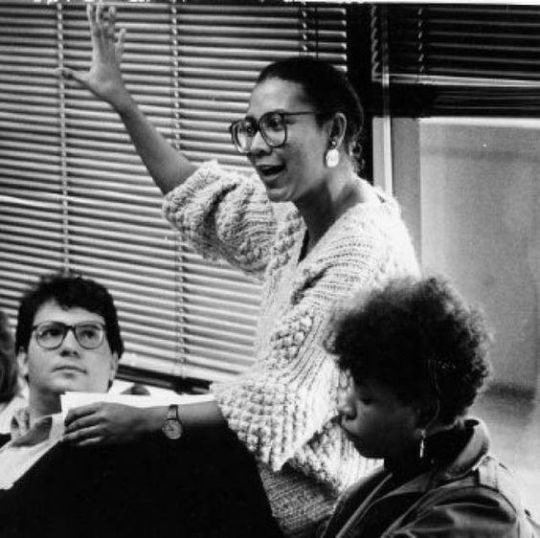
View On WordPress
#bell hooks#black history month#connection#culture#culture of silence#emotional expression#feminist scholar#gender relations#homosocialism#inclusivity#LOVE#patriarchy#vulnerability#wellbeing
2 notes
·
View notes
Photo
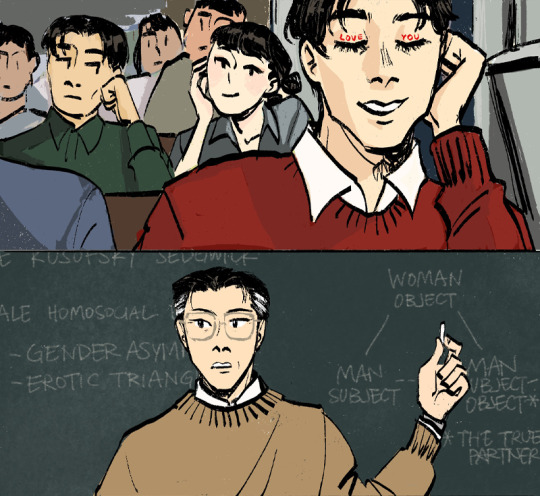
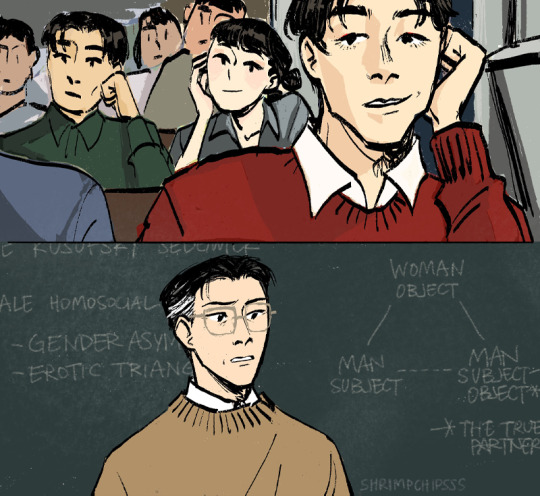
professor shen qingqiu, the most confusing man in academia
(redraw of that indiana jones scene)
#i just think it would be funny if he taught a queer studies class#he can monologue for hours on male homosocial desire but he is completely unknown to himself#sv fans you'd love between men by eve kosofsky sedgwick#sqq is full of homosocial triangles. between him binghe and every pidw wife he ever encounters#he is the first true instance of shipping characters as triangulation#we should give sqq even more frameworks with which to intellectualize and never have to feel his feelings#love him#shen qingqiu#luo binghe#sqq#lbh#svsss#scum villain#bingqiu#REUPLOADING W GLASSES OOPS#sv academia au
921 notes
·
View notes
Text
men talking about burt lancaster’s body. my favorite genre of gay literature

#okay??????? john le carré??#this is just in this paragraph there’s so many more rabid examples#burt lancaster: the homosocial icon#walter bernstein#mickey knox#john le carré#quote#an american life#kate buford#biography
77 notes
·
View notes
Photo
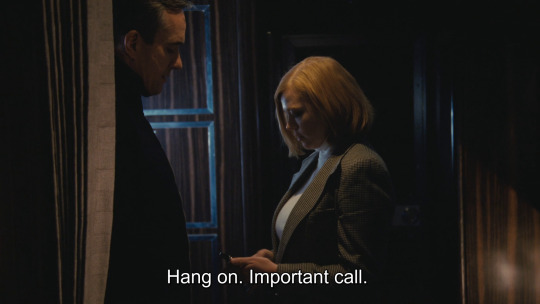

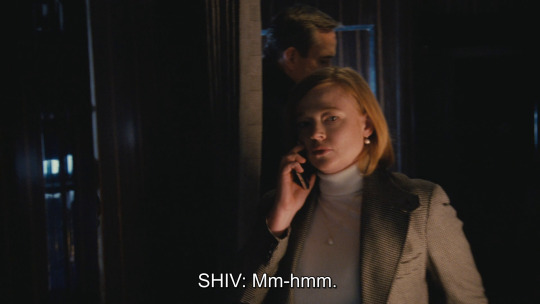
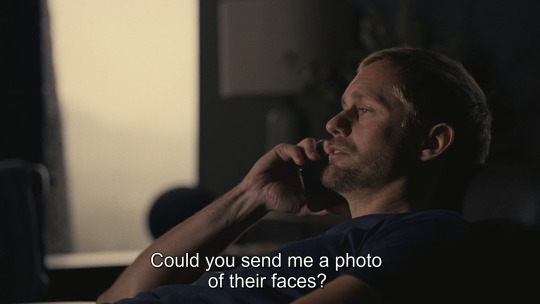




the innuendo of mattson phoning shiv for a “are you alone rn? send nudes” type of call but instead he’s asking for pics of her brothers
#succession#succession spoilers#sarah snook#alexander skarsgard#kieran culkin#jeremy strong#shiv roy#siobhan roy#lukas matsson#roman roy#kendall roy#tv#*#q#subtitles#suss#homosocial misogyny strikes again
236 notes
·
View notes
Text
Men are so hypocritical LMAO every other word out of their mouth, especially in comedic settings, is related to their penis but if a woman dares mention her pussy a few times men act like that’s all we care about. It’s so transparently a double standard, they make everything about their dick
#Interestingly enough if a woman makes a dirty joke related to penises then they like it and think we’re one of the good ones#But if it’s about OURSELVES and OUR BODY#they hate it#homosociality is a killer#My post#misogyny
37 notes
·
View notes
Text
Male Homosociality and War Crimes in The Patriot
Of all the problems The Patriot as a story creates for itself, the most interesting for me has always been this: how do you craft a villain when the hero is also a war criminal? It appears to me the filmmakers had a simple answer to this question staring them right in their faces, so why does a story that leans so heavily on the rumor that Banastre Tarleton habitually ordered the execution of surrendering Continental soldiers do absolutely nothing with the rumor that he habitually raped and allowed his men to rape colonial women? Surely, that would have helped to make Colonel Tavington as despicable as we are clearly meant to find him, particularly since the Patriot soldiers do not engage in rape, at least not literally. Instead, both Benjamin Martin and Tavington are tried by juries of their peers with Martin being nearly universally adored and Tavington being as nearly universally despised. This approach creates two problems. First, it means the Patriots, who something tells me are the people the audience is meant to sympathize with, are okay with some very fucked up actions both past and present. It also makes it hard to justify the Patriots' hatred for the British as whole when the audience sees how little support Tavington has.
Somewhat ironically given the myths about Tarleton, the only characters to directly mention rape in the film are Patriots, a father and son. As the Martin family anticipates survivors of the battle being in near proximity to them, Nathan attempts to titillates his siblings with this dire prediction: "They'll probably kill us men and do lord knows what to you women." In addition to shock among some in the audience, this elicits the question that always arises when a child says something incredibly fucked up: where did you hear that? Judging from her disgusted reaction, I do not think it was his caregiver Abigale. We get an answer some months later when Benjamin describes the events leading up to the Fort Wilderness massacre. "[The French and Cherokess] had killed all the settlers. The men . . . with the women and some of the children they had . . . we buried them." In the moment, Martin's hesitancy to name the particular violence these settlers suffered seems to speak to respect for them, but if so, he failed to convey that to either the son who makes the prediction earlier on or the even younger boy who giggles at it. This is the first time violence is referenced as a means of male bonding; it is certainly not the last.
The conversation between Martin and his oldest son referenced above is bizarre for a couple of reasons. Not only does the narrative twist Martin's confession to war crimes against the French and Cherokees in reprisal into evidence of his morality (he feels so bad about it!), but Gabriel is thoroughly nonplussed by this confession. He shifts the topic to his murdered brother and his desire to avenge him, but not at the expense of "the cause." Why is Gabriel so eager to take his father's supposed contrition at face value when he has personally seen him both hack a man's back to shreds with a tomahawk and participate in the murder of surrendering British soldiers a hell of a lot more recently than the French and Indian War? By the end of his life, Gabriel does more than tolerate his father's violent past. He approaches Tavington's prone form, believing him to be mortally wounded, to repeat it.
Bonding with his son through discussion of war crimes is not an anomaly among Martin's relationships. When he and Major Villeneuve recruit in the tavern, two of the men who sign up are acquaintances of Martin's from the previous war. One of them inquires about bounties and Martin give the intriguing response of "No scalp bounty this time, Rollins, but I'll pay for the gear of any redcoat you kill." How Rollins is going to prove the gear belonged to redcoats he killed who were not wounded or surrendering after Martin issues his orders against such conduct is a mystery the movie never clears up . When the other acquaintance, Billings, asks Martin if he is one of "that sort--" the sort Gabriel believes should not serve in the militia because, well, they're war criminals--Martin jokingly tells him, "You're the sort that gives that sort a bad name." Just boys being boys!
My favorite use of war crimes to further male bonding is the bizarre relationship between Martin and his second in command, Major Villeneuve. Initially the two grate on each other: Martin tortured French soldiers to death, while Villeneuve is French. The two offenses are presented as carrying basically equal weight. Ultimately, though, Villeneuve's objection to Martin is less that he committed war crimes but that he forbids Villeneuve from doing the same. But over time, they come to see each other in a different light. When Martin greets Villeneuve after the militia's ill-fated furlough, Villeneuve responds with a tongue in cheek, "Where else can I kill a few redcoats? Perhaps a few wounded ones when you're not looking." That Martin laughs nervously at this joke should be surprising, but it really isn't. While we haven't seen any wounded or surrendering men killed since Martin's order, nor have we seen any in militia custody. Has Villeneuve had a change of heart, or is Martin simply skilled in looking the other way? Later, Martin asks Villeneuve what color his slain daughters' eyes were as they march into the final battle, psyching him up to go and do their favorite activity together: vengeance! This shared priority, the only thing they have in common, outweighs their shortcomings in each other's eyes. Liberté, fraternité, and all that jazz.
Most of Martin's screentime, and he is in almost every scene, is spent developing his homosocial bonds, but even British men seem to regard Tavington with varying degrees of contempt, disgust, and fear. This lack of fellowship even characterizes his scenes with his own Green Dragoons. There are only two opportunities for dragoon comradery depicted in the movie: one where Tavington interrupts his men at dinner and one where he is grooming himself in the creek while they eat around their campfires. Tavington being left out of eating and drinking in particular becomes a recurring theme. His first meeting with Cornwallis, in the extended cut, happens after the Battle of Camden when the British officers are celebrating their victory. Tavington arrives late, apparently hungry from the way he immediately reaches for the food on the table, withdrawing his hand when Cornwallis draws closer to scold him. As he's dressing down Tavington, Cornwallis takes food from the same table and feeds it to his Great Danes. The exchange ends with Cornwallis proposing a toast, turning his back on Tavington and his second, who do not have glasses. The scene establishes that his role in winning a battle in no way makes Tavington's treatment of the enemy or civilians less odious, and his fellow officers are so united in this that no one so much as blinks when their general is incredibly rude to him. Over the course of the movie, they all maintain this conviction, except for one.
Producer Dean Devlin's describes Tavington as "seduc[ing]" Cornwallis into allowing him his brutal tactics, and this seems especially apt given the way their relationship develops on screen. As they grow closer tactically, they also grow closer physically. In their scene after Cornwallis ices Tavington out of his tent, Cornwallis remains seated at his desk while demanding that Tavington, who is standing on the opposite side, cease his brutal methods. In the scene following Cornwallis's humiliation at Martin's hands during the prisoner exchange, he is again seated at a table, eating dinner, while Tavington stands on the other side. From this point forward, though, there is a marked shift in the two men's positions. Cornwallis motions Tavington forward, and Tavingon approaches, putting as much space between himself and Cornwallis as we see between the general and the servant waiting on him as Cornwallis says, "I want you to capture [Martin]." If he intends to remind Tavington of his own servile position, the message does not register. Tavington takes a little stroll, peeks at Cornwallis's map, and helps himself to a glass of his claret, a stand-in for the glass he was denied at their first meeting. He assures Cornwallis, "I alone will assume the full mantle of responsibility, rendering you blameless" for his future crimes in pursuit of Martin. In light of Devlin's description of this scene, it does sound a bit like, Don't worry, babe, no one is going to know about this but you and me.
It is a ridiculous claim. When the Green Dragoons go on a veritable murder and arson spree after months of abstinence, it does not take a genius to realize that maybe the general of the whole fucking British army might have something to do with that. Nonetheless, by the end of this scene Cornwallis and Tavington are standing side by side for the first time in the movie. Their last scene is even more elicit. Cornwallis walks in on Tavington having his wound dressed to warn him against an early charge, the very same thing he scolds him for in their first scene, but this time Tavington is only in his shirt and his hair is loose and . . . it's a little on the nose, to be honest. And they're all alone. As powerful as Cornwallis is, he is also the only person Tavington ever convinces to condone his actions, and he can only do so by offering assurances he could not possibly grant. What does not change is the conviction of everyone in the British Army, Tavington included, that they will live and be remembered in infamy until the end of time if they do Bad Things to the Patriots. Meanwhile, the Patriots are bonding with each other almost exclusively through planning and doing Bad Things to them.
There are double-standards, and then there's this bullshit. Martin commits a dizzying amount of fuckery ranging from sending the Cherokees pieces of their fighters in bags to terrorize them into compliance to ordering his young sons to kill soldiers to apparently talking about rape in front of those sons in a way that left them thinking it is something to laugh about, and he is seen as a hero and a loving father by everyone around him. Tavington walks into a tent full of his fellow officers after a battle he helped win, and they all look at him like "Who invited Murder Molly?" Martin's men are devoted to him not in spite of his past war crimes but because of them, and the movie's insistence that he has changed his ways is, in the most generous terms, feeble. The thinly veiled homoeroticism of Tavingtion and Cornwallis's relationship only serves to underscore how marginal their position that war crimes can be justified under the right circumstances is among the British. Among the Patriots, that position appears to be standard.
Representing Tarleton's dragoons as the rapists some people of the time believed they were would obviously not have been great from a historical perspective, but it would be a drop in the ocean of inaccuracies the movie is adrift in. And it would have at least made the redcoats as bad as the characters the audience is meant to support! Both sides ultimately do terrible things, but they are framed by the narrative very differently in ways that inadvertently present the British in a favorable light. While the Patriots treat the vilest of war's excesses with understanding and sometimes even levity, the British have a horror of the idea that war exceeds the limits of the battlefield that is hard to fathom in professional soldiers. In the homosocial world of The Patriot, the ultimate measure of virtue lies not in actions but in the approval of other men.
#the patriot#jason isaacs#william tavington#banastre tarleton#benjamin martin#mel gibson#charles cornwallis#tom wilkinson#homosociality#seduction#if there was one more table#cornwallis was going to bend tavington over it
23 notes
·
View notes
Text
honestly a shame that midnighter never calls jack "jack offsmoor" i feel like theey could have had something there
#it's right there. what's the point of toxic homosocial jack and mid relationship if they aren't needling each other at every opportunity.#like. those old guys had smth gay going on don't question me on this. not sex. not friendship. a worse and eviler third thing.#croidhe#important. to me.#jack hawksmoor#midnighter#the authority
39 notes
·
View notes
Note
Okay, so I was re-reading your Slider one-shot for like the twentieth time, and what really struck me (beyond the brilliance of your writing, and the way you’ve presented the disillusionment of growing up, expecting the world to be a certain way, only to realize that life doesn’t quite work out the way you think it will, when you’re seventeen), is the casual sexism just tossed ‘round by our main characters!! :o We have canonical evidence of both Ice and Mav being pretty sexist (what with “the plaque for the alternates is in the ladies’ room” and the downright stalker-ish behavior exhibited by Mav at the O-club…), but it still surprised me a lil’ when twenty-y/o Ice was just like: “The Soviet Union did the impossible and taught women to drive” —and I realized that ah, he truly was born in 1959, or something. There’s little scenes throughout your story where I find myself wondering, which one of them is better, in this sense: When Ice tells Mav that Sarah isn’t talking to him ‘cause of his combat kills, justifies it by saying: “You know how women are”, and Mav tells him all women aren’t the same… I thought that maybe, it was Mav; but then later, Ice shows a distinctive amount of empathy for Juno, sees and respects her for the skilled pilot that she is… and I thought that maybe, it’s Ice after all—he does seem to be more progressive and accepting than Mav, in general? It also made me wonder, that if either of them had been a woman, would they even have respected the other person enough to consider them to be a rival??—or would it have a been a mildly-amusing circus side show for them, to have a female pilot at TOPGUN?
Ty for the ask anon!! ice is more socially progressive than mav yes.
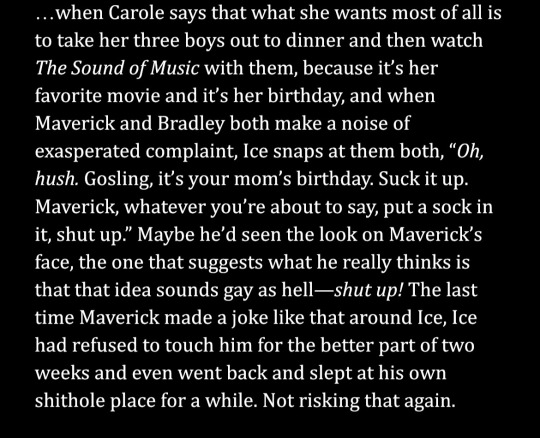
But—maybe this is my experience growing up in one of the bluest counties in Commiefornia and then going to one of the most leftist-coded colleges in one of the most leftist-coded cities in The World; uhh, even if a white man votes D all the time & has professional respect for women/minorities to their faces etc, get him in a room with a bunch of other white men, especially in a masculine and competitive environment like the gym or the navy, and uh. progressive or not, what you get is a lot of “The Soviet Union did the impossible & taught women to drive.”
And it was the 1980s. (As a reminder, in top gun’s 1986, less than 45% of Americans even approved of interracial marriage.) It sucks to say it, but if Ice was making fun of Cougar for quitting the navy cause of his psych issues such as they may be, and openly calling bullshit on Maverick’s MiG story in front of everyone, I am quite confident in saying he Would Not respect a female pilot to her face—if they were the same rank. At the same rank, it’s a competition. All weaknesses, even perceived biological ones, are to be exploited and called to attention. —But, once he’s advanced in rank, proven his own superiority, he’s more inclined to favor a meritocratic “sex doesn’t matter just fly good” attitude, ergo his relationship w/ “Juno” (she’s just a literary symbol to show that Ice may have respect for other minorities in the Navy “your career speaks for itself” but NOT FOR HIMSELF as a closeted man). This “who cares about gender/race just fly good” attitude is probably where 50s+ Maverick lands too, which is why no issues with Phoenix.
but jesus GOD maverick is a sexist in the original Top Gun. That’s why I wrote the prologue to WWGATTAI—a part of me definitely believes both he and Ice are definitively queer, but a part of me also wonders, are they just also conditioned to dismiss women as intellectual/societal equals because of their time in the 1980s male-dominated Navy? CAN they really only have a truly equal relationship with another man? I have no idea what my Ice’s sexual orientation is for exactly this reason. Yes, he’s functionally gay by the end of it, and that’s what I keep calling him—but sexuality is fluid & complicated. It’s definitely more-than possible he’s mostly straight and it’s just the circumstances of his wildly intense trauma-bond relationship with Maverick that led to their relationship as I wrote it. If you don’t LIKE/understand/respect women, and only feel at home/excited by committing acts of male-typified violence with the few men you respect, how does that bend your definition of the word straight? ...its still straight, but only straight-ish!
not to take it a step further, but WHY ELSE is canon maverick single in TGM? he canonically can’t make it work with women until he retires from the navy!!! he doesnt know how!!! His military environment is not conducive to normal long-term relationships with civilian women!!!
#and it’s well well documented that career military service does this to you!#Jesus look at cops. 40% etc.#yeah mil/LEO relationships with women are historically quite bad.#if you only respect men & then a man comes onto you—might be easier to sustain that relationship than with a woman you do not respect#I forget where i read it but this is the element of the homosocial vs the homosexual. i want to say Foucault but I think thats incorrect#EVE KOSOFSKY SEDGWICK. from her 'between men: English literature & male homosocial desire.' I think she's the preeminent homosocial scholar#if ur interested in 'further reading' not to sound like a geek#fellas is it gay to like women#after all…women kiss men…so if u kiss a woman ur kissing something that’s kissed another man…gay#ice (mid-makeout): well mavericks kissed women before so really this is the most heterosexual thing i could do#anyway#pete maverick mitchell#tom iceman kazansky#top gun#top gun maverick#icemav#asks#edts notes#mav is a social libertarian live & let live & keep the govt out of my bedroom (except for my marriage license uwu)#ice is a social moderate liberal. donates to actblue firmly believes diversity is the militarys greatest strength etc.#(i hope this isn’t too provocative to say but) look at ices outfit in tgm. libcoded. those gay little round glasses? solid lib.#the interracial marriage stat is from Gallup btw; 94% in 2021. weve come a long way. a lot has changed since 1986.#but our fav characters are FROM 1986 too so... we still cant forget that
83 notes
·
View notes
Photo

essay titles that would do numbers on tumblr.com
87 notes
·
View notes
Text

yeah <3 (from Between Knights: Triangular Desire and Sir Palomides in Sir Thomas Malory's "The Book of Sir Tristram de Lyones")
#the real source of strength and of emotional support for men lies in the fellow feelings of other men#oh im sure#fork found in kitchen#this article is definitely worth reading if you have access to jstor btw#btw this is haha funny gay and all but also homosociality in arthuriana is a super interesting topic im sooo normal about it#arthuriana#arthurian literature#medieval literature#arthurian legend#thomas malory#fuck me i hate tagging#le morte d'arthur#sir tristram#sir tristan#sir palomides#palomides and tristram#isolde#tristan and iseult
9 notes
·
View notes
Text
“Audre Lorde and Adrienne Rich have argued for an understanding of erotics that transcends procreative sexual contact and extends to the communities of women that emerge in response to oppressive regimes. In their view, heterosexist erotics are part of the compulsory heterosexuality that limits the full articulation of non-procreative desire and in which women lose many of their basic rights as property passed among men for the propagation of a phallocentric order. Sometimes, the relationships forged between women in response to oppressive regimes become physically sexual; sometimes they do not. From this perspective, sexual desire is not just a physical act but the root of all desire for action and unity and can exist in familial bonds (mother/daughter, sister/sister), among friends, and among all women. This desire should be viewed as a continuum that erases sexual stigma to allow for a larger sense of union and community forged through bonds between members of the same sex, which can always move toward sexual union and often are originally rooted in sexual desires suppressed by the regimes of compulsory heterosexuality. Lesbianism, thus, ceases to be pejorative to define a union of two women, usually presented in a butch-femme dichotomy, as something perverse or unnatural. In these formulations, lesbianism is a form of protest in which women find erotic fulfillment in each other and outside the confines of an erotics that must be focused on reproduction with a member of the opposite sex and is codified in heterosexual institutions such as marriage.
…
The obvious problem with transferring this premise to male homosexuality is that Rich’s use of Freud is too gendered to allow for that transference. It seems unlikely, however, that Rich intended to uphold Freudian sexual theories, which are generally deeply problematic for all queer and even non-queer identities. More likely, she was attempting to deconstruct the premise that Freud’s theory apply across gender lines, and in so doing she implicates the degree to which those theories fail to have universal applicability and, therefore, any applicability at all. If those theories lack universal applicability, then they must only have contingent and exceptionally specific application, which is to say that they have no applicability except for strictly within a limited Freudian perspective that does very little to explain the complexities of desire that circulate among members of lesbian and gay communities in the contextual ways that those communities conceive of themselves. Basically, she uses Freud to dismiss him, but she nonetheless proceeds to explain a version of Eros applicable to lesbian desire. She offers a theoretical framework to justify Lorde’s earlier theorizing about the multiple bonds that form between women, which Lorde places under the umbrella term erotic and in which she finds a source of power for women to define and shape their lives beyond being bound to men. Lorde and Rich claim Eros as a term for lesbian-identified women, and in so doing, they free it from its negative associations with Freud’s heterosexist rhetoric and make it a term with applicability to a broad range of desires beyond strictly heterosexual confines.
Though he never calls it Eros or erotic, John Howard, in Men Like That, effectively delineates the same concept for rural gay men when he attempts to explain the dynamism and movement that give “shape and scope” to the “queer life” of mid-century Mississippians (15). Though Mississippians had easy access to the nearby gay community in New Orleans, Howard pauses to explain that for gay men in rural Mississippi,
A more sporadic, on-the-ground, locally mediated queer experience prevailed. Tracking this experience and integrating the concept of networks with desire and pleasure finally allow a consideration of the human desire for friendship, companionship, love, and intimacy, as well as often unrelated, overtly sexual contact—homosocial as well as homosexual realms. (15)
This articulation of “human desire” reads as a version of gay erotics applied to male same-sex identity. This version of gay erotics uses sexual identity and desire to imagine and create new, nonheterosexist communities in a specific place and time. Howard explores how men in rural Mississippi fashioned means of interaction with each other in their seemingly isolated environment. Their erotic desires for unity created a distinct sense of identity. They found each other. They created connections. They did not simply waste away into death.
Gay erotics are a response for all queer-identified people to the oppressive regimes of compulsory heterosexuality that compel individuals into preset gender expectations and sexual roles. In the case of women (and men) who define themselves as, or find themselves defined as, queer/lesbian/homosexual, these erotics powerfully shape the way that we define ourselves in relationship to our surroundings and articulate our senses of self in relation to our own understanding of community and connection. Eros is at the heart of homosexual identity, only this Eros is not one of compulsory reproductive utility but of seeking likeness in an environment that defines one’s erotic drive as different. It is an oppositional drive, but one no less committed, and in fact driven, to unity than the heterosexual erotics articulated by Freud. In that formulation, gay desire is death. In this, it is life. And the outcome of gay desire is neither corrosive nor inhuman; it is, rather, a powerful drive simply to exist.”
— Phillip Gordon, Gay Faulkner: Uncovering a Homosexual Presence in Yoknapatawpha and Beyond
#this is one of the best summations of feminist queer theory I’ve ever read#one hundred percent cried in public while reading this#it didn’t help that I was listening to javelin while reading#queer theory#feminism#audre lorde#adrienne rich#Phillip Gordon#William Faulkner#freud#lit theory#queer history#homosocial
9 notes
·
View notes
Text

this is why we need to fund gay academia
#I've posted this on my old main but i need it here too#bc I know at least one (1) other person on this stupid site will appreciate it#it's the 'download scientific diagram' for me#it adds a layer of surrealism that elevates it into art#anyway. this is the tag I'm gonna use for these 3 from now on.#the homosocial triangle#merlin#merthur#merlin x mordred#arthur x mordred#(cursed tag)
94 notes
·
View notes
Text
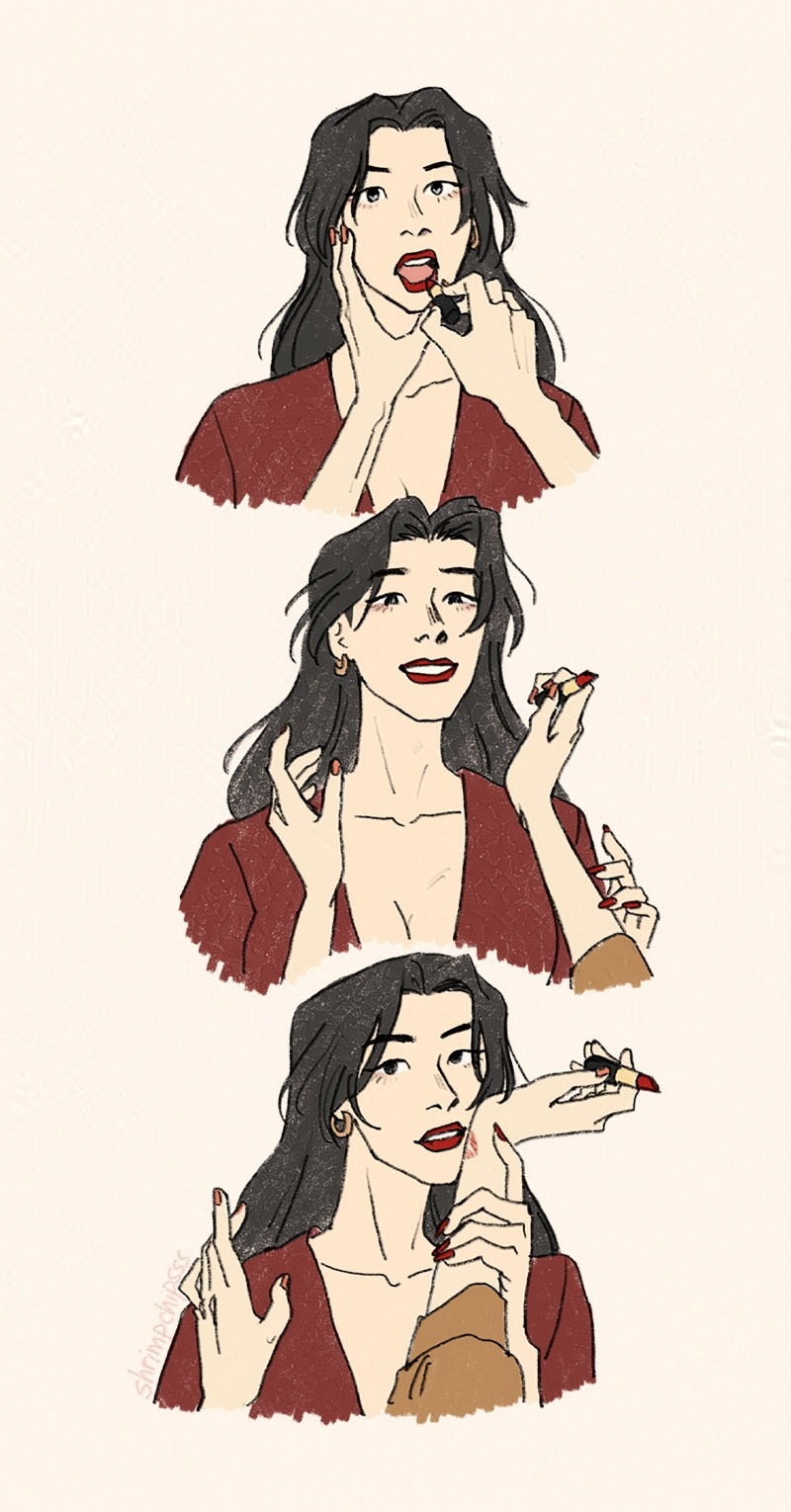
부탁해 언니
#lesbingqiu enjoyers stream cleansing cream by brown eyed girls there is a homosocial triangle going on in the lyrics#she's the most perfect girl in the world#luo binghe#lbh#bingjie#scum villain#svsss#rule 63#genderbend#described#fem!luo binghe
195 notes
·
View notes
Note
Do you think roy has always been attracted to men? Does he acknowledge it or even know? How would the realization go for him? Would he label himself?
I definitely think he's always been attracted to men, but I don't think he let himself lean into it until he was in his 30's. I've always thought of him as a late bloomer, because he's spent his entire life in such a hypermasculine/homosocial space, and I don't think he would have even felt like it was an option until the cultural shift + his leaving Chelsea in the 2010's. He's Roy Kent - he's like thee symbol of the last generation of the old guard unflinching, aggressive, hypermasculine footballers ("they don't make them like Roy anymore"), and he doesn't think of himself as someone who could ever be gay. He struggles with forming an identity outside of football and I think it'd be hard for him to really think about who he is and whether it's different than how he's perceived by the public until he had left Chelsea and people started to move on to younger names and stop obsessing about him all the time
I honestly have no idea how the realization would happen. I'm open to hearing everyone's ideas 😌
I don't think he would label himself, or at least not for a while. I think he'd struggle with verbalizing his feelings towards men at all, and trying to figure out which exact box he fits into is like. Not at the top of his priority list. I'm really into the idea of Roy as a gay man, but I can also see him as bisexual with a strong preference for men. Brett says Roy never really had relationships with women before Keeley, and to me his interest in women in canon seems pretty shaky + very much tied up in Jamie, so idk if it's genuine, but I can see him being into the occasional woman here and there, namely Keeley. So he might not be quite sure whether to call himself gay or bi and just decide (as usual) that he's not going to say anything about it and just scowl
#ask#roy kent#hypermasculine hypermasculine hypermasculine homosocial hypermasculine homosocial. <- me doing any meta of this show#I'm 100% a jamie scholar so I don't really have a lot of fully fleshed out roy hcs nd I always love clicking more pieces together#so <3 ty
38 notes
·
View notes
Text

so glad im not the only one thinking this. homosexuals are everywhere especially in ur gay ass action films♡♡♡♡♡
#thats extremely paraphrased but ik what they mean im just making jokes bc i (a homo) love talking abt the homosocial bonds n homoeroticisms#in the films i watch akdkflggjsls#ling.txt
8 notes
·
View notes
Text
as roman roy gay subtext enjoyer and a "roman roy is not above having a crush on his brother's best friend" truther, the small moment when stewy leans in to tell Roman he did good and the way Roman watches Stewy as he leaves....God!! I'm so grateful, immensely, unequivocally grateful that the last crumbs I got as a Roman Roy gay subtext enjoyer had nothing to do with the evil fucking fascist president!!! peace and love on planet earth <333
#roman roy#stewy hosseini#succession#diversity win!!! the 3 guys perpetuating homosocial misogyny are vaguely implied to be gay!!!
34 notes
·
View notes